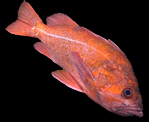
Hopkins Deep Reef
One of the larger "fields" of Metridium anemones in the Monterey area can be found at Hopkins Deep Reef. This well sheltered site is often visited when the weather precludes diving the outer reefs. In the early fall, dives at Hopkins Deep Reef provide an excellent opportunity to observe Mola mola. These bizarre looking fish receive cleaning services from the reef's population of sharpnose perch and juvenile blue rockfish. Though, divers aren't the only ones who enjoy the arrival of the Molas. Sea lions find the Molas' poor swimming ability provides for an easy meal despite the poison found in a Mola's body. Perhaps because they contain a lower concentration of toxins, sea lions generally eat only a Mola's dorsal and anal fin. Captured fish are brought to the surface where their fins are violently removed in a procedure that often sends the Mola skipping a considerable distance across the surface of the water.
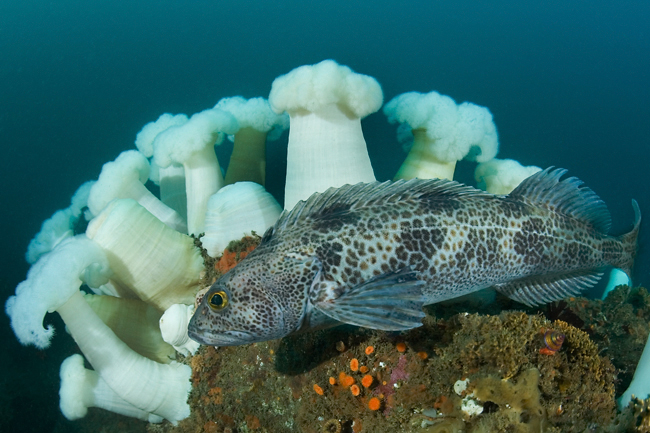
Large lingcod (Ophiodon elongatus) are seldom seen in areas under heavy
fishing pressure. At Hopkins Deep Reef, one encounters mostly runty ones like
this. Though, the fisherman's heartbreak may be the photographers joy: small
lingcod are nicely proportioned against a backdrop of Metridium
farcimen.
"Hopkins Deep Reef", Monterey Bay, California
January 21, 2007
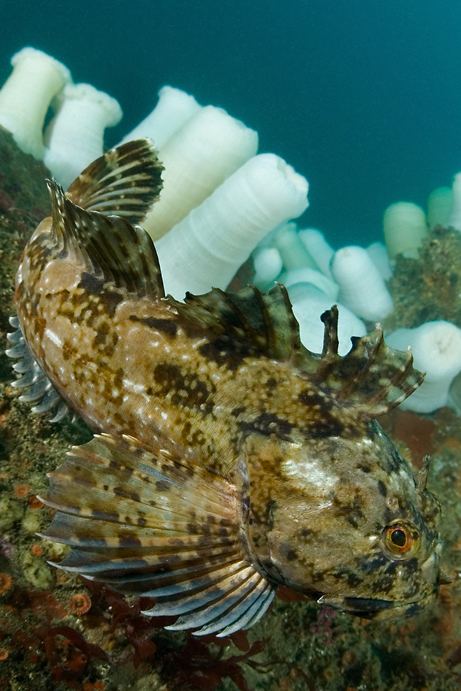
A cabezon (Scorpaenichthys marmoratus) on the move. This guy appears to
have an injured dorsal fin.
"Hopkins Deep Reef", Monterey Bay, California
January 21, 2007
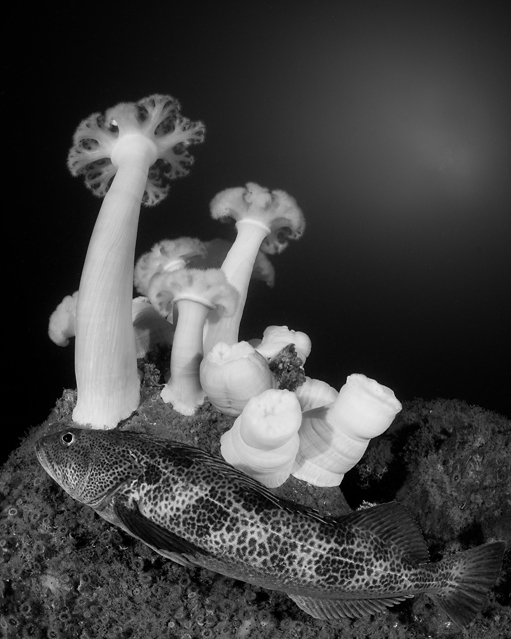
I spent a little time fussing with various pictures I'd taken, converting them
to black and white. I quickly discovered that while this seemed like a good
idea, the results usually look rather wretched. So, I decided that maybe I
should be thinking about black and white while still in the water. This is the
first shot I took with black and white conversion in mind. Metridium
farcimen and lingcod (Ophiodon elongatus) are both high contrast
elements. Of course, I would have liked a wonderful sunburst in the background,
but conditions didn't provide for this. Instead, I got a sun-blob.
"Hopkins Deep Reef", Monterey Bay, California
February 11, 2007
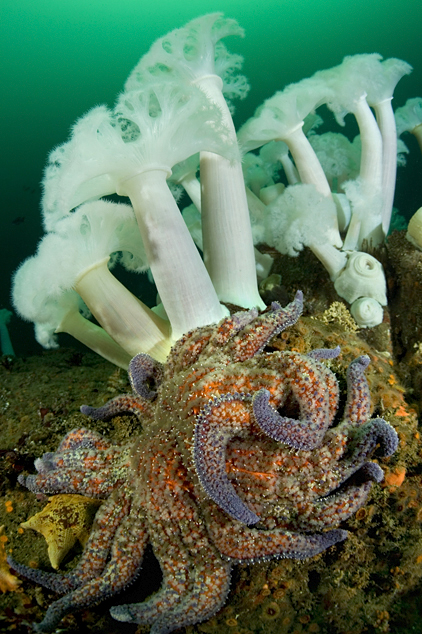
Visitors to Hopkins Deep Reef will immediately notice both the giant plumed
anemones (Metridium farcimen) and the sunflower stars (Pycnopodia
helianthoides). Sun stars most often assume a rather mundane posture. This
one, however, appears to have taken up some form of yoga. Sun stars, are, in
fact quite pliable. Hold one in your hand (above water, that is), and, apart
from the fact it's pretty much impossible not to rip off a number of the
animal's tube feet, you'll notice that they drape over your hand like a wet dish
towel.
"Hopkins Deep Reef", Monterey Bay, California
August 13, 2006
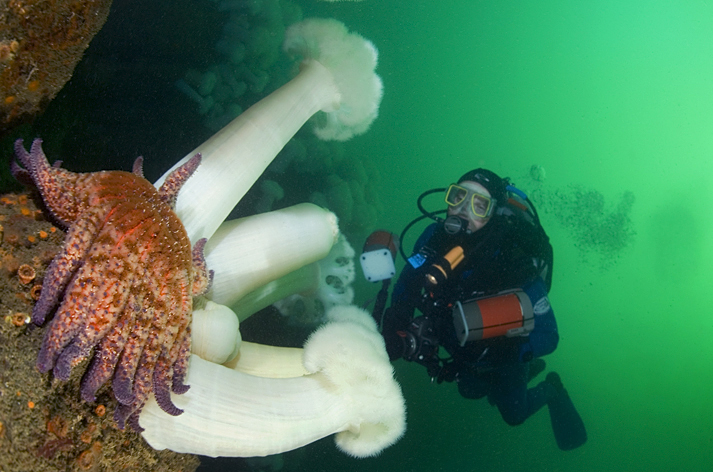
A sunflower star (Pycnopodia helianthoides) on the move near some
Metridium farcimen. Chuck Tribolet was kind enough to pose, completing
the scene.
"Hopkins Deep Reef", Monterey Bay, California
May 14, 2006
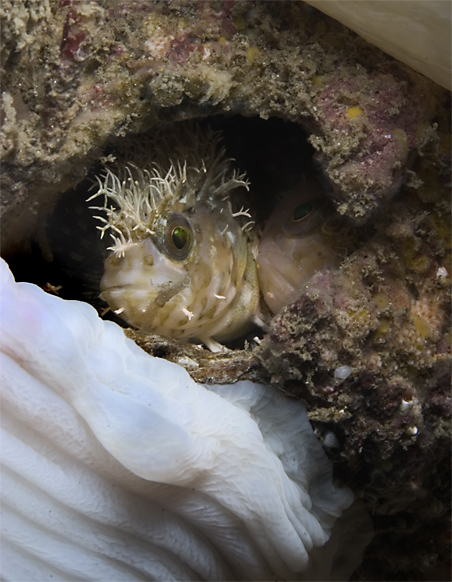
These mosshead warbonnets (Chirolophis nugator) inhabited this empty
barnacle for several weeks before they disappeared. An octupus moved into the
vacated residence soon after.
"Hopkins Deep Reef", Monterey Bay, California
December 24, 2004
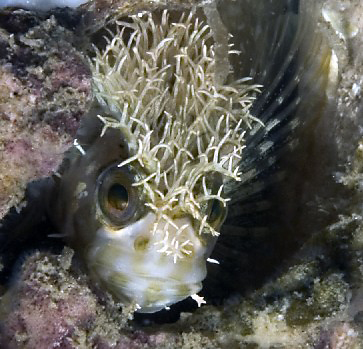
Having seen this finger-sized mosshead warbonnet (Chirolophis nugator) on
several consecutive outings to the same location, the photographer decided to
dive for a day using a camera lens suitable only for subjects of this size. This
decision proved unfortunate when the photographer found himself holding a
useless camera in the company of an exceptionally inquisitive 30 ft. gray whale.
"Hopkins Deep Reef", Monterey Bay, California
December 24, 2004
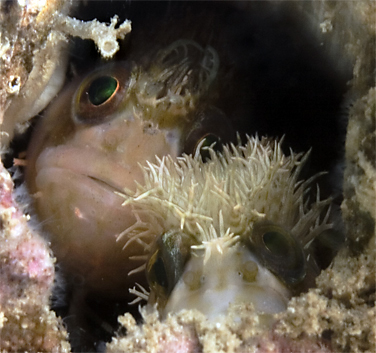
A mosshead warbonnet (Chirolophis nugator) peering over the head of
another.
"Hopkins Deep Reef", Monterey Bay, California
December 24, 2004

Home
